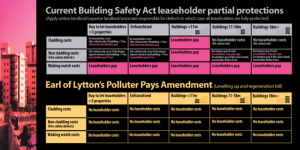New Amendment Plans to Deter Banking Crisis and Reform Building Safety Standards

London, UK 21st April 2023 – An amendment to the Levelling Up and Regeneration Bill is on course to be debated by the Earl of Lytton in the House of Lords on Monday, 24th April 2023. The Polluter Pays Amendment will provide additional protection to property owners who have discovered their buildings were not constructed to correct regulation standards and are not only living in potentially unsafe conditions but also facing high remediation costs.
The Building Safety Act of 2022 currently provides leaseholders with varying degrees of statutory protection from the costs of cladding and non-cladding remediation and interim safety measures such as waking watches. The Act was a result of the Grenfell Tower fire in 2017, which exposed a catastrophic failure in fire safety regulations and left tens of thousands of people living in unsafe buildings. Leaseholders, through no fault of their own, were facing bills running into the tens, or even hundreds of thousands of pounds for the remediation of fire safety defects.
However, many leaseholders still receive little or no protection from non-cladding remediation costs. Buy-to-let owners with more than three properties, enfranchised leaseholders and those living in blocks below 11 metres are particularly vulnerable to these expenses.
The Polluter Pays Amendment, based on drafting by Daniel Greenberg (former parliamentary counsel and currently Parliamentary Commissioner for Standards) to the Levelling-up and Regeneration Bill, provides for an alternative comprehensive solution to the building safety crisis.
The amendment would make either the builder or developer pay in full if found by the government to have breached building regulations at the time of construction or fund via a wide construction industry levy if they can’t pay. This will protect leaseholders from all costs resulting from defective building practices. It would also eliminate commercial corner-cutting and prevent future catastrophes like the Grenfell Tower fire.
The Polluter Pays Amendment could also work to prevent a potential banking crisis, as many unprotected leaseholders are completely exposed to huge costs. The threat of lease forfeiture, which has historically been a very rare event, could become a far more common outcome for many buy-to-let and enfranchised owners, wiping out an entire lender’s security unless further capital is provided.
Pension funds that are invested in ground rent funds face significant unanticipated costs. In the worst case, a thinly capitalised or significantly indebted landlord group could fail with unknown consequences and costs for hundreds of thousands of people if unsellable freeholds escheat to the Crown.
If the government implements this amendment, a potential banking crisis and the suffering of hundreds of thousands of homeowners around the country could be prevented. Former State Premier of Australia, Ted Baillieu, recognises this amendment as a global precedent for cultural reform in construction across the world.
“This amendment’s going to cover off everything – not just cladding but all defects and all other costs and establish a principle that if you don’t build according to the regulations, it doesn’t matter how long ago you did it, you’ll have to pay to fix it.” – Ted Baillieu
The Earl of Lytton will say in his address to the House: “The simple truth is the government does not have the money to solve the problem and is at present unprepared to place the responsibility on the wealthy construction industry that has created this over decades of marking its own homework. The proposals I am advancing would resolve this.”
Advocates of the Polluter Pays Amendment have worked hard to educate the public on the need for changes to current safety standards. For more information, visit the Polluter Pays Twitter page.
